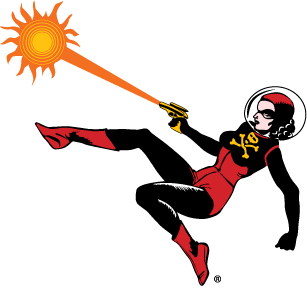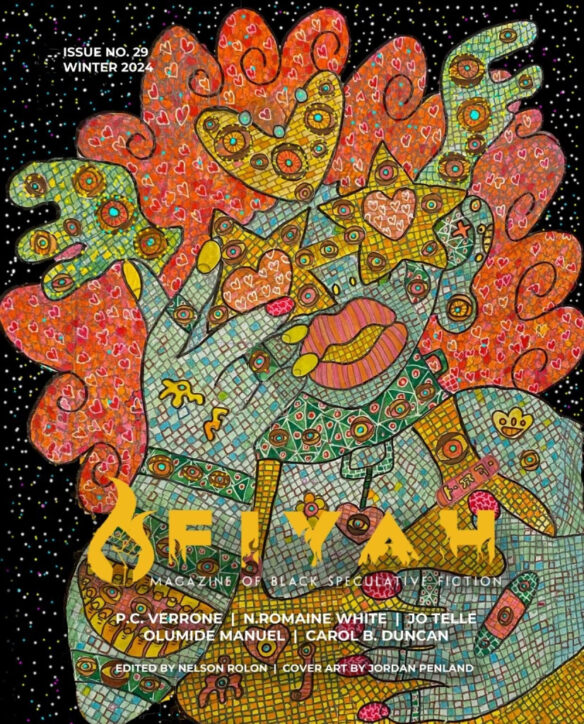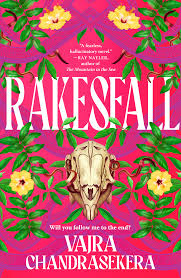
The Otherwise Award winners for 2024 are:
- In Universes by Emet North
- “Kiss of Life” by P.C. Verrone
- Rakesfall by Vajra Chandrasekera
- Walking Practice by Dolki Min, translated by Victoria Caudle




The Otherwise Award (formerly known as the Tiptree Award) honors stories that expose the many ways we experience gender in this world and others. The authors of the winning works will each receive $200 in prize money, and a medal commemorating their Award. The jury also shared an Honor List of five works:
- “The Flame in You” by L. Nabang
- Sacrificial Animals by Kailee Pedersen
- The Sapling Cage by Margaret Killjoy
- “Scarlett” by Everdeen Mason
- Vanessa 5000 by Courtney Pauroso
Each year, a jury selects Otherwise Award winners and a list of additional notable works that celebrate science fiction, fantasy, and other forms of speculative narrative that expand and explore our understanding of gender. The jury is encouraged to take an expansive view of “science fiction and fantasy” and to seek out works that have a broad, intersectional, trans-inclusive understanding of gender in the context of race, class, nationality, and disability.
The 2024 jury members were Eugene Fischer (chair), Avery Dame-Griff, E. Ornelas, Elsa Sjunneson, Liz Haas, and Sophia Babai. We thank each of them for their many dozens of hours of service!
The winning works will be celebrated and discussed at WisCon 2025, during the Sunday night gala (including speeches by the authors as well as the singing of a celebratory filk), and in a panel during the convention. WisCon 2025 (also known as WisCONline) will be online from May 23 through 26; registration is pay-what-you-wish.
Following the jump are some of the jurors’ thoughts on why they chose this year’s Award winners and Long List.
ABOUT THE WINNERS
IN UNIVERSES BY EMET NORTH
In Universes is an exquisitely crafted novel that looks at the possible lives of its main character across many different realities, starting out largely realistic and becoming more speculative with each passing chapter. The book uses this conceit to explore personal gender and sexual identity, generational trauma, disability, motherhood, varied kinds of physical embodiment and—most notably—personal fallibility, hypocrisy, and repentance.
That process of self discovery, of learning oneself and constructing one’s identity, can be messy and uncertain in ways that extend beyond the strictly personal. People figuring themselves out can easily hurt other people, whether through selfishness and cowardice, or simply via the unavoidable pain of dashed expectation. While personal gender exploration, discovery, and transformation are legitimate, the potential for making mistakes and harming others in the process is very real, and the pain felt by those who are hurt is also legitimate. So, if we are going to celebrate and defend gender exploration, we owe it to ourselves and those we care for to ask: how do I address cases where, in doing something that feels necessary for me, I hurt somebody else? How do I responsibly remain in community with and care for those I have injured or wronged?
These are questions that In Universes addresses directly. It’s a story of many versions of a person who struggles with self-loathing, egocentrism, and internalized homophobia, and how they learn to see and atone for selfish harms caused to others. As the main character is Jewish, it’s reasonable to call this a novel about t’shuva—the active, restorative process of repentance. Their thoughtfully-explored, reality-bending path to finally learning that “being a good person isn’t something you do alone” is a valuable contribution to the literature of SFnal gender exploration.
—Eugene Fischer
“KISS OF LIFE” BY P.C. VERRONE
In “Kiss of Life,” author P.C. Verrone cleverly adapts common fantasy tropes in the service of an exacting deconstruction of colonialism and gender. Our unnamed narrator, born with a weak heart, is initially traded as a commodity until she is taken in by the Angels, otherworldly beings who need human sacrifices to build their Great Works. The narrator comes to serve as a translator for the Angels, transforming her into their mouthpiece. Yet watching the sacrifice of her father transforms her relationship with the Angels forever. As “Kiss of Life” illustrates, oppression comes not only through the imposition of “traditional” patriarchal gender norms but also the colonizers’ supposedly progressive “empowerment.” In both cases, misogyny dictates women and girls are valuable primarily as disposable tools to further others’ ends.
Instead of telling this point outright, the story is recounted to an unknown but presumably young audience, beautifully and distinctively capturing the sense of a maternal figure telling a story. This storytelling frame allows the reader to come to this realization alongside the protagonist, who recounts this story to her presumably young audience. Moreover, this story-within-a-story framing gives the work’s title, “Kiss of Life,” a dual meaning as well. Often alongside the Angels comes the “Kiss of Death,” catastrophic events where whole cities are wiped from the Earth. Whereas this Kiss eliminates all records of these people, the narrator’s story is a Kiss of Life for both her audience and the reader, a generational cultural memory which ensures their sacrifices would never be forgotten.
—Avery Dame-Griff
RAKESFALL BY VAJRA CHANDRASEKERA
Rakesfall is a bizarre, brilliant, relentlessly challenging book. The storytelling and craft are stunning, and every single sentence feels completely intentional, even when you have absolutely no idea what’s going on. Which is most of the time.
The story centers on two characters, one most often a woman and one most often a man, who reincarnate across different worlds and lifetimes. The handling of gender, like everything else in the story, is deliciously, wonderfully, infuriatingly complex. Rakesfall explores gender from a thousand angles, from painfully familiar gender-stereotypical dynamics like “battered wife defends abusive husband at the expense of the son who’s trying to protect her” to wonderfully bizarre scenarios like two spirits incarnating into the same body, experiencing comfort and dysphoria at once.
Rakesfall is gleefully confusing and frequently uncomfortable, and it also shines a light on how we run from confusion and discomfort. The artificial identities, borders, and hierarchies we create in a quest for safety and power. The way we turn away from truths that are uncomfortable, or even straight-up murder people for telling truths that are uncomfortable. The way we leave behind the real world and create a new world that looks how we think the world SHOULD look, smells how we think the world SHOULD smell. The story deliberately, carefully, skillfully shepherds you through the experience of confusion in order to say “look, see, you can be confused and you will still survive, you can be confused and you will still laugh and cry and live and die and have adventures and eat the rich, you can be confused and the world will still go on and on and on, and meanwhile all these fake artifacts and identities you created to avoid confusion will disappear anyway.” If that isn’t expansive, I don’t know what is.
—Sophia Babai
WALKING PRACTICE BY DOLKI MIN, TRANSLATED BY VICTORIA CAUDLE
Walking Practice uses its extraterrestrial perspective to highlight elements of gender performance that often pass notice as natural or normal. The novel centers on a shapeshifting alien who has crash-landed in Seoul and survives by subsisting on humans that they meet through dating apps. While “alien who exists outside the gender binary” is a common trope, the main character’s commentary defamiliarizes social expectations of gender in a way that sets it apart from the other iterations I have encountered. The title comes, in part, from the main character’s observations of the ways that men and women are expected to walk and move as they attempt to blend in. The narrator’s analysis, in its efforts to understand and mimic these normative movements, highlights how these are not inherent: they are enforced by society telling you that you have to move in a particular way to be seen as “acceptable” in your gender role. The alien’s efforts to conform to these gender expectations while struggling to hold together its human shape also gesture toward the intersection of gender-based oppression and ableism. The main character’s narration is profoundly funny; there’s a perverse enjoyment that comes from reading the narrator’s description of a terrible date that ends with devouring their hookup partner. When looking for speculative fiction that explores and expands ideas of gender, I really hoped to find works that get weird with it, and Walking Practice undeniably hit the mark for me.
—Liz Haas
ABOUT THE LONG LIST
In addition to selecting the winners, each year’s jury chooses an Otherwise Award Long List of notable works.
“The Flame in You” by L. Nabang
“The Flame in You” tells the story of Everett and Lucien, brothers in a Cameroonian immigrant family, throughout their childhood and teen years. Compared to Everett, Lucien fails to meet both Everett’s and his father’s rules, choosing instead to kindle his own flame. In “Flame,” Nabang explores how patriarchal expectations and zero-sum thinking strangle relationships between men. In her thoughtful and tender prose, Nabang beautifully illustrates the generational trauma of such abuse, and the legacy of loss it leaves behind.
—Avery Dame-Griff
Sacrificial Animals by Kailee Pedersen
Sacrificial Animals is a story about alienation and environmental harm, about the relentless brutality of rural white masculinity, about prejudice and patriarchy ripping families apart. It’s also about shapeshifting fox spirits who tear off men’s heads. What else do you want from a book?
The plot follows the Morrow family, a deeply repressed family of white men living in rural Nebraska, and their destruction at the hands of a fox spirit whose babies they killed. It’s impossible not to compare to Stephen Graham Jones’s The Only Good Indians, another story of human men committing hideous violence against female animals and their young, and being brutally punished for it. What sets the story apart is its exploration of Orientalism and the particular viciousness of white American men toward themselves, their children, and the more-than-human world.
Pedersen’s writing is superb and haunting. Vicious violence against children and animals is described in a dull, one-note, almost perfunctory manner, while a white man’s attraction to a Chinese woman is described with florid terror.
—Sophia Babai
The Sapling Cage by Margaret Killjoy
The Sapling Cage centers on a young woman named Lorel who joins a coven of witches, hiding that she is transgender. Without giving too much away, what makes this story distinct in its gender exploration is how Lorel grapples with her gender identity in a world where magic exists. For Lorel, part of her journey is figuring out what she needs to feel safe and accepted (by herself and others) in her identity, and how or to what extent she needs magic to gain this sense of self-acceptance. The book also examines power, autonomy, community, and justice more broadly through Lorel’s evolving relationships with the coven members and the people she meets in her travels.
—Liz Haas
“Scarlett” by Everdeen Mason
In “Scarlett,” Everdeen Mason offers a new telling of the classic Pygmalion and Galatea narrative to explore the associations between femininity, service, and ownership, as well as themes of selfhood and consent. In it, protagonist Jon strives to create the “perfect” AI Scarlett, allowing her to learn from observing his life. A story for the current moment, Mason’s sharply observed characterizations speak to how modern technological visions are driven by a desire to instantiate existing gender structures. As Scarlett’s knowledge of Jon and the world grows, her vision of her “perfect” self diverges from Jon’s vision. In the process, Jon’s frustration at Scarlett’s failure to achieve “correct” femininity speaks so vividly to the performative aspects of gender, and the story’s haunting ending highlights how the obsessive pursuit of perfection ultimately smothers all it touches.
—Avery Dame-Griff
Vanessa 5000 by Courtney Pauroso
Vanessa 5000 is a brilliant achievement in physical comedy. Courtney Pauroso draws from clowning tradition to create the character of a sex robot being presented at a tech convention. Through this character, Vanessa 5000 comments on the use of tech and mass data collection to enforce gender roles. Vanessa is just a little bit off, evocative of what a neural network might present when fed the entirety of the internet and trained on what an average tech bro perceives as sexy. Pauroso demonstrates remarkable precision in her portrayal of this character, which makes it all the more delightful when the tech presentation goes off the rails in the latter half of the show.
—Liz Haas
RECOMMENDATIONS AND MORE. The process for selection of the 2025 Otherwise Award is under way. The Otherwise Award invites everyone to recommend works for the 2025 Award. You can also donate to help fund the Award.
The Otherwise Award began in 1991 as The James Tiptree, Jr. Award, named after Alice Sheldon, who wrote under the pseudonym James Tiptree, Jr. By her choice of a masculine pen name, Sheldon helped break down the imaginary barrier between “women’s writing” and “men’s writing.” In 2019, the Award’s governing body, the Motherboard, decided, in response to community concerns, to rename the Award. The Tiptree Award became the Otherwise Award. (For more on the reasons behind the change, visit the history section of the Award’s website.)
[Based on a press release.]
Discover more from File 770
Subscribe to get the latest posts sent to your email.
